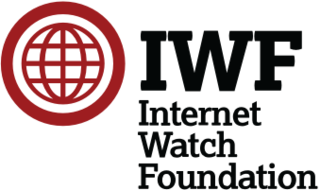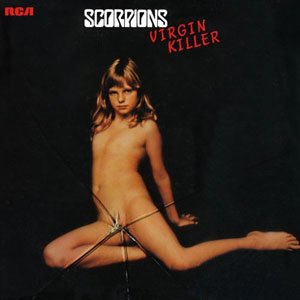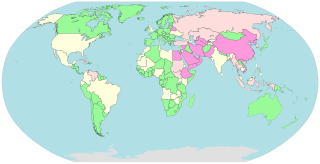An Internet filter is software that restricts or controls the content an Internet user is capable to access, especially when utilized to restrict material delivered over the Internet via the Web, Email, or other means. Content-control software determines what content will be available or be blocked.
Internet censorship in Australia is enforced by both the country's criminal law as well as voluntarily enacted by internet service providers. The Australian Communications and Media Authority (ACMA) has the power to enforce content restrictions on Internet content hosted within Australia, and maintain a blocklist of overseas websites which is then provided for use in filtering software. The restrictions focus primarily on child pornography, sexual violence, and other illegal activities, compiled as a result of a consumer complaints process.
Censorship in South Korea is implemented by various laws that were included in the constitution as well as acts passed by the National Assembly over the decades since 1948. These include the National Security Act, whereby the government may limit the expression of ideas that it perceives "praise or incite the activities of anti-state individuals or groups". Censorship was particularly severe during the country's authoritarian era, with freedom of expression being non-existent, which lasted from 1948 to 1993.


Internet censorship is the legal control or suppression of what can be accessed, published, or viewed on the Internet. Censorship is most often applied to specific internet domains but exceptionally may extend to all Internet resources located outside the jurisdiction of the censoring state. Internet censorship may also put restrictions on what information can be made internet accessible. Organizations providing internet access – such as schools and libraries – may choose to preclude access to material that they consider undesirable, offensive, age-inappropriate or even illegal, and regard this as ethical behaviour rather than censorship. Individuals and organizations may engage in self-censorship of material they publish, for moral, religious, or business reasons, to conform to societal norms, political views, due to intimidation, or out of fear of legal or other consequences.
Most Internet censorship in Thailand prior to the September 2006 military coup d'état was focused on blocking pornographic websites. The following years have seen a constant stream of sometimes violent protests, regional unrest, emergency decrees, a new cybercrimes law, and an updated Internal Security Act. Year by year Internet censorship has grown, with its focus shifting to lèse majesté, national security, and political issues. By 2010, estimates put the number of websites blocked at over 110,000. In December 2011, a dedicated government operation, the Cyber Security Operation Center, was opened. Between its opening and March 2014, the Center told ISPs to block 22,599 URLs.
Internet censorship in the United Kingdom is conducted under a variety of laws, judicial processes, administrative regulations and voluntary arrangements. It is achieved by blocking access to sites as well as the use of laws that criminalise publication or possession of certain types of material. These include English defamation law, the Copyright law of the United Kingdom, regulations against incitement to terrorism and child pornography.
According to research done by the Organisation for Economic Co-operation and Development (OECD), the Netherlands is ranked with Switzerland in having the most broadband subscriptions per 100 inhabitants, has no bandwidth caps, and has the most homes passed in Europe in terms of connection speeds of 50 Mbit/s and higher.
Censorship in Denmark has been prohibited since 1849 by the Constitution:
§ 77: Any person shall be at liberty to publish his ideas in print, in writing, and in speech, subject to his being held responsible in a court of law. Censorship and other preventive measures shall never again be introduced.

The Internet Watch Foundation (IWF) is a registered charity based in Cambridge, England. It states that its remit is "to minimise the availability of online sexual abuse content, specifically child sexual abuse images and videos hosted anywhere in the world and non-photographic child sexual abuse images hosted in the UK." Content inciting racial hatred was removed from the IWF's remit after a police website was set up for the purpose in April 2011. The IWF used to also take reports of criminally obscene adult content hosted in the UK. This was removed from the IWF's remit in 2017. As part of its function, the IWF says that it will "supply partners with an accurate and current URL list to enable blocking of child sexual abuse content". It has "an excellent and responsive national Hotline reporting service" for receiving reports from the public. In addition to receiving referrals from the public, its agents also proactively search the open web and deep web to identify child sexual abuse images and videos. It can then ask service providers to take down the websites containing the images or to block them if they fall outside UK jurisdiction.

On 5 December 2008, the Internet Watch Foundation (IWF), a British watchdog group, blacklisted content on the English Wikipedia related to Scorpions' 1976 studio album Virgin Killer, due to the presence of its controversial cover artwork, depicting a young girl posing nude, with a faux shattered-glass effect obscuring her genitalia. The image was deemed to be "potentially illegal content" under English law which forbids the possession or creation of indecent photographs of children. The IWF's blacklist are used in web filtering systems such as Cleanfeed.
Censorship in Finland refers to government policies in controlling and regulating certain information.

The February 2010 Australian cyberattacks were a series of denial-of-service attacks conducted by the Anonymous online community against the Australian government in response to proposed web censorship regulations. Operation Titstorm was the name given to the cyber attacks by the perpetrators. They resulted in lapses of access to government websites on 10 and 11 February 2010. This was accompanied by emails, faxes, and phone calls harassing government offices. The actual size of the attack and number of perpetrators involved is unknown but it was estimated that the number of systems involved ranged from the hundreds to the thousands. The amount of traffic caused disruption on multiple government websites.
There is medium internet censorship in France, including limited filtering of child pornography, laws against websites that promote terrorism or racial hatred, and attempts to protect copyright. The "Freedom on the Net" report by Freedom House has consistently listed France as a country with Internet freedom. Its global ranking was 6 in 2013 and 12 in 2017. A sharp decline in its score, second only to Libya was noted in 2015 and attributed to "problematic policies adopted in the aftermath of the Charlie Hebdo terrorist attack, such as restrictions on content that could be seen as 'apology for terrorism,' prosecutions of users, and significantly increased surveillance."
Ampparit.com is a Finnish online news portal founded in 2004. The service provides its users with an easy-to-use list of news headlines, consisting of material from Ampparit's more than 250 media sources. It is also possible for users to search for news of their special interest.

In Russia, internet censorship is enforced on the basis of several laws and through several mechanisms. Since 2012, Russia maintains a centralized internet blacklist maintained by the Federal Service for Supervision of Communications, Information Technology and Mass Media (Roskomnadzor).
The precise number of websites blocked in the United Kingdom is unknown. Blocking techniques vary from one Internet service provider (ISP) to another with some sites or specific URLs blocked by some ISPs and not others. Websites and services are blocked using a combination of data feeds from private content-control technology companies, government agencies, NGOs, court orders in conjunction with the service administrators who may or may not have the power to unblock, additionally block, appeal or recategorise blocked content.
The child abuse image content list is a list of URLs and image hashes provided by the Internet Watch Foundation to its partners to enable the blocking of child pornography & criminally obscene adult content in the UK and by major international technology companies.

The Police of Finland is a national government agency responsible for general police and law enforcement matters in the Republic of Finland. The Police of Finland is subordinate to the Ministry of the Interior and consists of the National Police Board, two national police units and 11 local police departments.

This list of Internet censorship and surveillance in Europe provides information on the types and levels of Internet censorship and surveillance that is occurring in countries in Europe.







